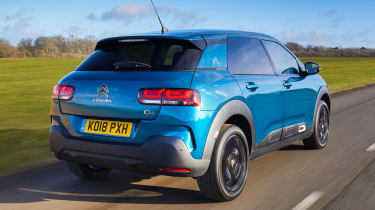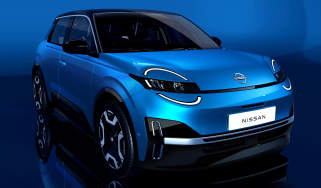Citroën C4 Cactus hatchback review (2014-2021)
"The Citroen C4 Cactus is an individual, practical and affordable family car with some well thought-out features like clever suspension to soak up bumps"
Pros
- Low running costs
- Distinctive styling
- Comfortable ride
Cons
- Not great fun to drive
- Suspect interior quality
- Rear windows don’t go down
When it was launched back in 2014, the distinctive design of the Citroen C4 Cactus stunned the automotive world. Its unique ‘Airbumps’ in particular gave the car an individuality sorely lacking in many rivals. Although it’s based on the Citroen C4 hatchback, the Cactus has strong SUV overtones, which helped it steal sales from more conventionally styled models.
A refresh in 2017 saw tweaks to the C4 Cactus’ design, with the relocation of the Airbumps to the lower part of the doors the biggest change. There was a minor restyle of the front and rear of the car and significant improvements made to the car’s ride quality and refinement. Three trim options were previously available but that’s now down to just one single model: the high-spec Flair version.
The C4 Cactus features clever Progressive Hydraulic Cushion (PHC) suspension, which comes close to rekindling the much-vaunted 'magic carpet ride' of the classic Citroens of old, namely the DS and 2CV. This setup provides extra suspension damping for potholes and broken road surfaces, with the result that the car is remarkably free of shake and shudder. This high level of comfort is aided by Citroen’s latest 'advanced comfort' seats, which are fitted as standard.
Another key Cactus feature is its relatively low asking price – it undercuts many family hatchbacks and packs more features to boot. It's fairly cheap to run, too – particularly the remarkably economical 1.5-litre BlueHDi diesel engine. This is claimed to return up to 63mpg thanks to stop-start technology. If you'd rather a petrol engine, the 1.2-litre PureTech with 108bhp cheaper to buy and still returns up to 51.5mpg.
More reviews
In-depth reviews
Remarkably, given their impressive fuel economy, none of the Cactus' engines disappoint on the road. Even the least powerful is fine for around-town driving, where it pulls away from the lights sharply enough to handle urban traffic in a confident manner. However, if you make frequent long journeys or often encounter steep gradients, you may be happier with one of the more powerful options, which include the 128bhp petrol that can manage 0-62mph in just 8.6 seconds.
Although some Cactus versions are quite fast, none is especially exciting to drive. Instead, the emphasis is squarely on comfort, with light, easy steering that isn't exactly precise or rich with feedback. Passengers will love it, though, thanks to its smooth suspension and squidgy armchair-like seats.
The C4 Cactus range was reorganised in 2019 to consist of just the Origins and Flair models in response to demand for higher spec cars - but now only the latter exists, as the Origins was a special-edition model. Flair packs a lot of kit, including 17-inch alloy wheels, front and rear parking sensors, automatic lights and windscreen wipers, automatic air-conditioning, cruise control, a reversing camera Apple CarPlay and Android Auto. What it doesn’t have, in common with all Cactus models, is fully opening rear windows. They only pop open outwards. Otherwise, inside the Cactus is a nice place to be, with refreshingly individual styling – although the materials feel a little flimsy in some places.
Our biggest reservation is Citroen’s lacklustre reputation for owner satisfaction – the Citroen C4 Cactus finished 73rd out of the 75 cars ranked in our 2020 Driver Power owner satisfaction survey, and it’s occupied similarly low places in the last couple of years. Citroen put in a slightly better performance in the brand survey, coming in at 18th out of 30 manufacturers. Owners criticised Citroen’s infotainment systems, including the sat-nav and Bluetooth functions, lacklustre stereos, small gloveboxes and the smoothness of their car’s gearboxes. They were happier with practicality and running costs.
The original Cactus was awarded four out of five stars by Euro NCAP in crash tests, but the new version gets autonomous emergency braking as standard, so we’ll need to see if it’s retested.
The fundamental design does much to recommend itself, though, not least for its comfort, economy and that superlative ride quality. If Citroen can answer the reliability and safety quibbles, the C4 Cactus will be an even more compelling package.













